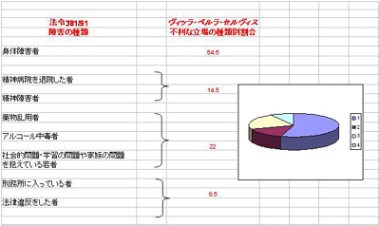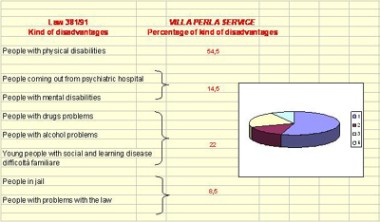国際セミナー報告書「各国のソーシャル・ファームに対する支援」
講演1 資料2
ヴィッラ・ペルラ・セルヴィス….…タイプB 社会的協同組合
ヴィッラ・ペルラ・セルヴィス
- タイプB 社会的協同組合
- 1994年 イタリア ジェノバで設立
- 従業員(組合員) 220名
- 社会的に不利な立場にある人々 83名
- 総売上高 5百万ユーロ
C.R.E.S.S.(ソーシャルサービス地域コンソーシアム)
- ソーシャルサービス地域コンソーシアムの会員構成
- 9つのタイプA社会的協同組合
- 2つのタイプB社会的協同組合
- 従業員 2000名
- 総売上高 3千万ユーロ
事業内容…
- ケータリング
- 公立学校の給食調理
- 高齢者向けの食事宅配
- 在宅高齢者・障害者向けの清掃および調理サービス
- 公的機関による高齢者在宅介護事業における洗濯サービス
- 民間事業および行政を対象とした全般的なサービス
- フロント受付および接客サービス
- 秘書業務および電話受付サービス
- 公園およびグラウンド整備
- 海辺の清掃
- 駐車場管理

不利な立場にある人々
近年我々の協同組合には様々な種類の疾病を持つ多数の不利な立場にある人々が含まれる。
彼らの多くは認定されず、法律が認めたカテゴリーに属してはいないが大きな、様々な問題を抱えていた。
社会的協同組合は社会に増大する疾病の新たなニーズや種類に応えようとし、地域のコミュニティにとって重要なパートナーとなる。
他のカテゴリー
法律で定められたカテゴリー以外に我々の協同組合で含められたその他の不利な立場にある人々は次のような人々である。
- 社会・経済による疾患を持つ人々
- 一つの収入源しかない家族
- 扶養する児童を持つ女性
- 移民
- 障害と認められていない軽度の障害者
目標
不利な立場にある人々を職場や同時に社会生活に統合していくことがゴールとなる。
この使命の中に社会的価値観があり、その価値観が幅広いリハビリテーションと教育プロジェクトのなかで不利な立場にある人を統合させる。
このインクルージョンの仕事をどのように行うか
地域のソーシャルサービスに関わる人や障害者や不利な立場にある人々のインクルージョンを担当する人がいる。
彼らは供に不利な立場にある人に最も適切な仕事を見つけ出す。(仕事の種類、作業グループ、継続の期間、毎日の労働時間など)ソーシャルインクルージョンのプロジェクトを準備する。
最初に不利な立場にある人は他の人々と働く。そのうちの一人がインクルージョンプロジェクトの個別指導者になる。
このオンザジョブトレーニングの期間中に不利な立場にある人と個別指導者が協同組合の責任者と地域のソーシャルサービスの責任者と供に月に一回会う。インクルージョンプロジェクトを監視し、確認するためである。
このプロセスの期間は通常6ヶ月間である。(更新は可能)
オンザジョブ訓練の時期は協同組合は不利な立場の人に費用はかかりません。一方でその人は地方自治体から補助金を受けることができる。
最後にそのプロジェクトについて評価をし、より良い評価を持って通常の雇用契約で協同組合に雇用される。そして数ヶ月を経て生活協同組合員になり、選挙権を持ち総会に参加することが可能となる。
VILLA PERLA SERVICE….…a social cooperative type B
Giovanna Maranzana 28/01/07
VILLA PERLA SERVICE
- Is a social cooperative type B
- Founded in 1994 in Genova (Italy)
- 220 employees (members)
- 83 disadvantaged people
- 5 million Euros as turnover
C.R.E.S.S.(Consorzio Regionale Servizi Sociali)
- Member of Regional Consortium of Social Services is composed of
- 9 Social Cooperatives type A
- 2 Social Cooperatives type B
- 2000 employees
- 30 million Euros as turnover
Our activities…
- Catering
- Meals for public schools
- Meals on wheels for elderly people
- Cleaning and food preparation in homecare for elderly and disabled people
- Laundry service for public homecare for elderly people
- Global service for industry and public administration
- Front office and concierge services
- Secretarial and telephony services
- Parks and ground maintenance
- Beaches cleaning
- Car parking managing

Disadvantaged people
In these years in our Cooperative have been enclosed many dozens of disadvantaged people,with different kind of disease.
Many of them had big and various problems,although they were not certified and belonging to the categories recognized by law.
The social cooperatives are going to respond to the new needs and kind of disease,growing up in our society and they become more and more an important reference point for the local community.
Other categories
Beyond the categories mentioned by the law other disadvantaged people included in our cooperative are
- People with social economic disease;
- Families with just one income;
- Women with dependants children;
- Immigrant people;
- Persons with light handicaps which are not recognized as such.
Aims
The goal of including disadvantaged people at work is to include them at work and at the same time in social life.
There is a social value in this mission,because the person is integrated in a wider rehabilitation and educational project.
How we do this work
There is a Responsible person for inclusion of disabled and disadvantaged people,related with the local social services.Together they match the person with the cooperative and they find out the most adequate job.(Kind of job,working group,duration time,daily working time...) They prepare a project of social inclusion
At the beginning the disadvantaged person works with other people,one them become the tutor for the inclusion project.
During this“on the job” training period,the disadvantaged person and the tutor meet once in the month with the Responsible person of the cooperative and the Responsible person of the local social services,in order to monitor and verify the inclusion project.
Usually the duration of this process is 6 months(renewable).
During this period the cooperative has any charge for the person,while he receive some grants from the social services.
At the end there is a general evaluation of the person and the project;with positive evaluation the person is employed in the cooperative in a regular way,with a regular employment contract.
After some months he/she become member of the cooperative and he/she can participate to the general assembly with election rights.
